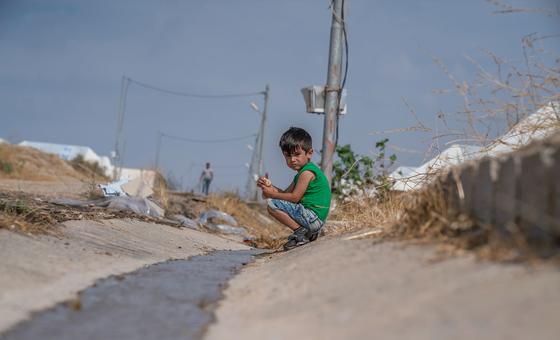Catherine Russell made the appeal in a statement to mark World Children’s Day, which commemorates the adoption of the UN Convention on the Rights of the Child (CRC) – the most widely ratified human rights treaty in history.
“At no time since the CRC was adopted 34 years ago have children’s rights been in greater jeopardy,” she said.
Children in the crosshairs
Although the 1989 treaty acknowledges that all boys and girls have inalienable rights which governments promised would be protected and upheld, “unfortunately, children today are living in a world that is increasingly hostile to their rights,” she said.
Nowhere is this more obvious than in the experience of children impacted by conflicts. UNICEF estimates that some 400 million – roughly one in five – are living in or fleeing conflict zones.
“Many are being injured, killed, or sexually violated. They are losing family members and friends. And some are being recruited and used by armed forces or groups,” said Ms. Russell.
She added that many have been displaced multiple times, risking separation from their families, losing critical years of education, and fraying ties to their communities.
One billion face climate risk
Furthermore, it was “deeply troubling” that this coincides with other threats to children’s rights including rising poverty and inequality, public health emergencies, and the climate crisis.
Globally, more than one billion children currently live in countries that are at ‘extremely high-risk’ from the impacts of climate change, according to UNICEF.
“This means half the world’s children could suffer irreparable harm as our planet continues to warm,” said Ms. Russell.
“They could lose their homes or schools to increasingly violent storms … they could suffer from severe wasting because local crops have dried up from drought … or they could lose their lives to heat waves or pneumonia brought on by air pollution.”

Children in Maroua, Domayo, in the Far North of Cameroon, a region impacted by the conflict in the Lake Chad region coupled with climate change.
‘Children need peace, now’
Ms. Russell called for stronger advocacy towards the fulfillment and protection of children’s rights, including through supporting the alignment of national legal frameworks with the CRC and ensuring accountability for violations wherever they occur.
UN Secretary-General António Guterres put it plainly in a post on the social media platform X, formerly Twitter. “Children need peace, now,” he wrote.
‘A day for mourning’
Also sounding the alarm is the UN Committee on the Rights of the Child, which “calls for ceasefires and a return to basics of humanitarian law to safeguard all children.”
World Children’s Day has become “a day for mourning for the many boys and girls who have recently died in armed conflict,” members said in a statement.
“More than 4,600 children have been killed in Gaza in only five weeks. This war has claimed the lives of more children in a shorter time and with a level of brutality that we have not witnessed in recent decades,” they said.
War on children
Although a UN Security Council resolution adopted last week, which calls for humanitarian pauses and corridors, is a positive step, they said “it does not end the war that is waging on children – it simply makes it possible for children to be saved from being killed on some days, but not on other days.”
The Committee also voiced concern over the thousands of children dying in armed conflicts in many other countries, including Ukraine, Afghanistan, Yemen, Syria, Myanmar, Haiti, Sudan, Mali, Niger, Burkina Faso, the Democratic Republic of the Congo and Somalia.
“Verified figures show that in 2022, the global figure of children killed or maimed was 8,630,” they said. “Of deep concern is the fact that up to 4,000 children were denied humanitarian access last year. Given the current situation in Gaza, the number of child victims of these grave human rights violations is rising exponentially.”
‘Crisis point’ for girls
The rights experts also highlighted the situation of girls affected by armed conflict which “is also at a crisis point”, with verified reports of the abduction and rape of girls in Sudan and Haiti.
Additionally, they expressed concern over children of “so-called ‘foreign fighters’”, such as those currently in camps in northeast Syria who should be repatriated.
While some States have acted to return children and their mothers, they said an estimated 31,000 children are still living in abysmal conditions in the camps.
They also drew attention to the plight of boys who are being separated from their mothers when they reach early adolescence, as well as several hundred boys who are in prison.

